 MyDogBreeds
MyDogBreeds Perro de Pastor Mallorquin is originated from Spain but Lithuanian Hound is originated from Lithuania. Perro de Pastor Mallorquin may grow 12 cm / 5 inches higher than Lithuanian Hound. Perro de Pastor Mallorquin may weigh 8 kg / 18 pounds more than Lithuanian Hound. Both Perro de Pastor Mallorquin and Lithuanian Hound has almost same life span. Perro de Pastor Mallorquin may have less litter size than Lithuanian Hound. Perro de Pastor Mallorquin requires Moderate maintenance. But Lithuanian Hound requires Low maintenance
Perro de Pastor Mallorquin is originated from Spain but Lithuanian Hound is originated from Lithuania. Perro de Pastor Mallorquin may grow 12 cm / 5 inches higher than Lithuanian Hound. Perro de Pastor Mallorquin may weigh 8 kg / 18 pounds more than Lithuanian Hound. Both Perro de Pastor Mallorquin and Lithuanian Hound has almost same life span. Perro de Pastor Mallorquin may have less litter size than Lithuanian Hound. Perro de Pastor Mallorquin requires Moderate maintenance. But Lithuanian Hound requires Low maintenance
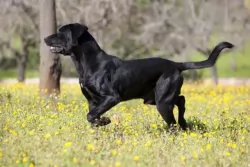 Known also as the Majorca Shepherd Dog or Ca de Bestiar, the very name Perro de Pastor Mallorquin means Shepherd dog of Mallorca.
Known also as the Majorca Shepherd Dog or Ca de Bestiar, the very name Perro de Pastor Mallorquin means Shepherd dog of Mallorca.
The dog hails from Spain and has been used as a general purpose farm dog. The diligent work of fans of the dog to encourage its development were rewarded when the dog - both short- and long haired varieties - gained recognition from the Fédération Cynologique Internationale.
The dog is really only popular in its homeland where it is appreciated for its guarding and herding abilities.
 This attractive dog hails from Lithuania.This is an old dog breed that has been used as a hunting dog.
This attractive dog hails from Lithuania.This is an old dog breed that has been used as a hunting dog.
It is believed that this dog dates way back to the 16th century and that it was developed from the mixing of hound breeds – Bloodhounds, Beagles, Polish Hounds and Russian Hounds.
The numbers of the dogs decreased and in the late 1970s, the Lithuanian Cytological Council developed a kennel facility for restoring Lithuanian Hound numbers, and a standard was also written. This breed is rare and is not usually found outside the Republic of Lithuania.
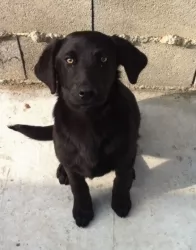 The Perro de Pastor Mallorquin is a large dog which stands between 62 and 73 cm and weighs between 35 and 40kg. Most of them are short haired, ensuring low grooming requirements for the owner. The coat is black, in fact the Fédération Cynologique Internationale says its the only color which is acceptable. He has floppy ears and the tail is long, rising when the dog is on the move.
The Perro de Pastor Mallorquin is a large dog which stands between 62 and 73 cm and weighs between 35 and 40kg. Most of them are short haired, ensuring low grooming requirements for the owner. The coat is black, in fact the Fédération Cynologique Internationale says its the only color which is acceptable. He has floppy ears and the tail is long, rising when the dog is on the move.
The Perro de Pastor Mellorquin is a dominant, independent and wilful dog that will need to be trained and socialized if he is to be obedient. He is fiercely devoted to his owner, being loving and protective. This training is actually important as the Majorca Shepherd Dog doesn't take easily to strangers and can in fact show signs of aggression when around them.
It is qualities like this that make him a good guardian and watchdog. With training and socialization he will be able to get on well with other pets in the home as well as with children who have been taught how to respect- and be kind to animals.
He is an active dog too and it is better to have such a dog in the suburbs or the countryside as opposed to living in a small city property.
 The Lithuanian Hound is a medium-sized dog which stands at between 53 - 61 cm in height and weighs between 27 to 32kg.
The Lithuanian Hound is a medium-sized dog which stands at between 53 - 61 cm in height and weighs between 27 to 32kg.
He is a well proportioned, sturdy dog, heavily boned and muscular with straight, strong legs. The coat of the dog is short, smooth and essentially black with some tan markings. He has a large head, bright brown eyes, black nose, deep, broad chest and long, floppy ears with rounded tips. The tail of the dog is long and held low.
The attractive Lithuanian Hound is a sighthound known for his hunting skills which he does with great determination and stamina.
He loves going on the hunt and forms a strong bond with his hunting handler, being reserved with people he doesn’t know. Lithuanian Hounds are generally easy to train and are eager to please. Training and socialization will be easy with a dog like this as he is intelligent and keen to please.They respond well to an owner who is confident, fair, patient and consistent.
His attachment to the family makes him a good watchdog too. After the hunt, he becomes an amicable, friendly, loving dog, loving to spend a quiet evening with his human family. He is energetic and doesn’t take too kindly to sitting around for long periods. He loves to be on the go and will require a good deal of vigorous exercise.
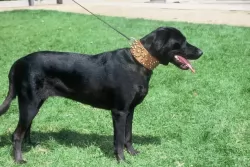 The Perro de Pastor Mallorquin is a dog known for its devotion to its owner, taking on his role as guardian and protector very seriously.
The Perro de Pastor Mallorquin is a dog known for its devotion to its owner, taking on his role as guardian and protector very seriously.
It is a courageous dog, strong willed and confident and isn't recommended as a first choice of dog for the novice dog owner, although there have been first-time dog owners who bring their dogs up correctly and have tremendous success with them.
Provide your dog with a firm consistent, kind, patient and loving home, and you can also be one of those first-time dog owners who highly recommend this dog as an awesome pet for any household.
 The Lithuanian Hound has always been a dog used for hunting, so he wants to belong to a family where hunting is still practiced or where there is a large garden.
The Lithuanian Hound has always been a dog used for hunting, so he wants to belong to a family where hunting is still practiced or where there is a large garden.
He is smart and easy to train, and what’s more he’s a healthy, robust, low maintenance dog. He’s an amicable dog too, calm, independent and confident, and will make a splendid companion to his human family. He gets on well with children and is willing to share his space with other dogs too.
By choosing the Lithuanian Hound, you’re allowing a wonderful canine friend into your home and heart.
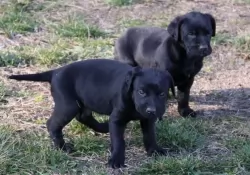 A dog can live a long, happy life when he has been looked after well. Makig sure he doesn't become obese, giving him enough exercise and loving him can ensure longevity. Your Perro de Pastor Mallorquin can live to be 13, 14 or 15 years of age, but there are always some common dog illnesses to be aware of -
A dog can live a long, happy life when he has been looked after well. Makig sure he doesn't become obese, giving him enough exercise and loving him can ensure longevity. Your Perro de Pastor Mallorquin can live to be 13, 14 or 15 years of age, but there are always some common dog illnesses to be aware of -
This is a disease of the hip where the ball and socket joint isn’t formed properly. The result is a joint that rubs as opposed to sliding smoothly. This is one of the most common skeletal diseases in dogs seen more often in large dogs. The disease can start while the dog is still young and it can lead to osteoarthritis an decreased activity.
One of the eye diseases is when the uvea of the eye becomes inflamed, creating a painful condition known as anterior uveitis or inflammation of the front of the eye.
This disease can threaten your dog’s vision. It is painful with redness of the eye, there could be a discharge too as well as excessive watery eyes. Cancer, infections and injury can all be to blame and your vet will want to examine your dog.
 Lithuanian Hounds can reach 12 – 14 years of age when they’re loved and well cared for. You won’t find many medical problems with this robust dog breed, but it pays to know some of the more common dog illnesses.
Lithuanian Hounds can reach 12 – 14 years of age when they’re loved and well cared for. You won’t find many medical problems with this robust dog breed, but it pays to know some of the more common dog illnesses.
This is a genetic condition that affects the hips and which can lead to painful arthritis. Dogs prone to hip and elbow dysplasia always benefit by avoiding obesity.
Deep chested dogs are more prone to Bloat, occurring when gas builds up in the stomach and can’t escape. This is a life threatening illness and immediate medical attention will be required.
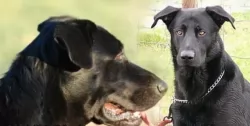 The Majorca Shepherd Dog isn't a heavy shedder but still, he will require some basic grooming such as brushing the coat twice a week to remove loose hairs and to retain his natural shine.
The Majorca Shepherd Dog isn't a heavy shedder but still, he will require some basic grooming such as brushing the coat twice a week to remove loose hairs and to retain his natural shine.
Other care and grooming routines for your pet are to check inside his mouth for dental disease as problem teeth can cause a host of diseases in the body.
Check inside his ears too and make sure they aren't red and itchy as this could be indicative of an ear infection.
Nail clipping is also important as his nails can hook onto things and rip open the flesh around the paw area.
These dogs are lively and energetic, having been used to do lots of work herding and guarding sheep. He isn't a dog to be left in the backyard day after day without human inter-action and exercise. He will require some hectic exercise every day and will love to join you with your jogging or cycling, running beside you. Take him with you on our walks and hikes.
Only the best dog food is recommended for this dog of yours. If you intend feeding your pet commercially manufactured food, make sure its the best quality ones – those with protein listed at the top of the ingredient list and with a good amount of vitamins and minerals.
Choose the food according to your dog's size, his age and his energy levels. If you're going to give your pet home-made food, keep it simple to avoid upset stomachs and vet's bills.
Boiled chicken, brown rice or pasta and cooked vegetables such as spinach, sweet potato and carrots are wonderful for a dog when added into the kibble occasionally as a tasty treat. You can also try to include some raw meat into the kibble from time to time.
Dog's just want simple, wholesome foods like this, no unpleasant surprises of spicy, 'people foods'. Never leave your pet without a supply of fresh, cool water.
Take your puppy to the vet to have his vaccines, as the canine parvo-virus (CPV) infection for instance, isn't only a very contagious viral illness that affects dogs, it can be a killer. Keep a check on your adult dog too and see that he gets to the vet at any sign of illness.
 This energetic dog is going to want a lot of exercise as he has always been a hunting dog. While a long, brisk walk will be excellent for him, he will want more activity than that. He’ll want to be included in all your activities – walks, hikes, camping trips and swimming.
This energetic dog is going to want a lot of exercise as he has always been a hunting dog. While a long, brisk walk will be excellent for him, he will want more activity than that. He’ll want to be included in all your activities – walks, hikes, camping trips and swimming.
A big positive with the beautiful, sleek Lithuanian Hound is that he is looked upon as a low maintenance dog. The short coat will require a good brush down twice a week.
He sheds a couple of times during the year. He’s the kind of dog who thrives on these grooming sessions and it’s a time to check him over for ticks and fleas as well as for odd lumps.
Look inside his ears too, particularly since he is a floppy eared dog. Open his mouth too and keep his teeth brushed and clean. There is special canine toothpaste and toothbrush for this purpose. Never try to use human toothpaste as it can be toxic for your dog.
There are a number of things to consider when it comes to feeding your dog, but it goes without saying that the best, most nutritious food will ensure health and longevity.
If you feed your pet commercially manufactured pet food, use the feeding guidelines found on the packaging labelling. With any new food types you give your dog, keep an eye on him for reactions.
Your dog’s metabolism and energy levels as well as his age will determine how much to feed him.
There are many excellent dog foods available – choose an excellent one and make sure to feed your dog some tasty, nutritious home-made food too.
You can’t go wrong with some cooked chicken, brown rice or pasta and some raw and cooked vegetables. Chop up and add to his dry kibble from time to time and he’ll be happy and healthy. Raw meat is expensive but try and include some every now and then as it contributes to allergy-free skins, bright eyes, shiny coats, wet noses and wagging tails.